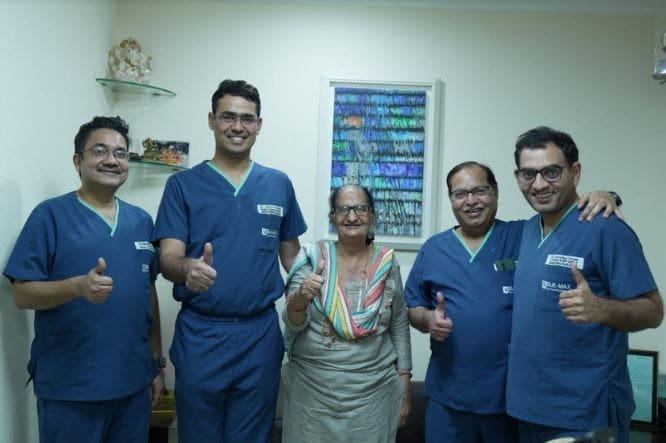The outcome demonstrates the effectiveness of interdisciplinary collaboration at Max Healthcare
Doctors at BLK-Max Super Speciality Hospital successfully treated and gave a new lease of life to 67-year-old woman suffering from kidney cancer and blockages in major arteries in heart through two major surgeries within 2 days.
Doctors at BLK-Max Hospital successfully treated 67-year-old suffering from high-risk heart ailment and kidney cancer
Led by a team of medical experts, including Dr. Surender Kumar Dabas, Vice Chairman, Oncology, Dr. Ramji Mehrotra, Chief, Cardiothoracic & Vascular Surgery and Dr. Vikas Thakran, Senior Consultant & Unit Head – Interventional Cardiology at BLK-Max Super Speciality Hospital, multi-disciplinary surgeries were performed, resulting in an optimal clinical outcome that defied all odds.
The patient was suffering from kidney cancer. She came to BLK-Max Hospital for the treatment. During evaluation, it was found that patient had class III angina, hypertension, and type 2 diabetes mellitus. Her coronary angiography showed significant triple vessel disease needing prior treatment to mitigate the increased risk of major cardiac events during cancer surgery.
The medical team collaboratively discussed and devised a comprehensive treatment plan to ensure the best outcome for the patient. The challenge was that the patient required complete revascularisation with four stents, necessitating dual antiplatelet therapy (giving blood thinners to prevent blood clots that can cause a heart attack or stroke). Delaying the nephrectomy surgery risked kidney cancer progression while performing it with single antiplatelet therapy was suboptimal.
The surgical plan involved coronary artery bypass surgery using bilateral mammary artery grafts and a robotic right radical nephrectomy the next day. Performing nephrectomy (Nephrectomy is the surgical removal of all or part of a kidney. It is usually done to prevent cancer spread) on a patient who had undergone major coronary bypass surgery posed significant challenges due to the risk of intra-operative bleeding.
Dr. Surender Kumar Dabas, Vice Chairman, Oncology, BLK-Max Super Speciality Hospital, “The utilisation of robotic surgery proved advantageous, allowing for a minimally invasive approach and precise vascular control. This approach reduced bleeding, magnified 3D visualization, and adherence to oncological principles. The safe robotic procedure enabled the early initiation of anticoagulants, crucial for post-coronary bypass care, leading to a rapid recovery and early ambulation. The patients progress was remarkable, and she was discharged on the 6th post-operative day.”
Dr. Ramji Mehrotra, Chief, Cardiothoracic & Vascular Surgery, BLK-Max Super Speciality Hospital said, “Embracing a comprehensive and collaborative approach our surgical strategy encompassed the utilisation of bilateral mammary artery grafts for coronary artery bypass surgery. By meticulously considering the challenges at hand, we aimed to optimise patient care through the exploration of safe myocardial revascularization with total arterial bypass, thereby striving for superior long-term outcomes. The arterial grafts have more chances of remaining patent even without blood thinners.”
Dr. Vikas Thakran, Senior Consultant & Unit Head, Interventional Cardiology, BLK-Max Super Speciality Hospital, highlighted the significance of the multidisciplinary approach, stating, “Non-cardiac surgery after myocardial revascularisation is a challenging scenario, often requiring a delay of several months. However, in this case, where delaying the oncological surgery was not an option, we employed a multi-disciplinary approach to address the underlying coronary artery disease simultaneously.”
This successful outcome exemplifies the power of a coordinated multidisciplinary approach, where experts from different medical specialties collaborate to mitigate risks and deliver optimal patient care.
About Max Healthcare
Max Healthcare Institute Limited (MHIL) is one of India’s largest hospital chains (considering only income from healthcare services) in fiscal 2023. It is committed to the highest standards of medical and service excellence, patient care, scientific and medical education.
MHIL has a major concentration in North India consisting of a network of 17 healthcare facilities. Out of the total network, eight hospitals and four medical centres are located in Delhi and the NCR, and the others are located in the cities of Mumbai, Mohali, Bathinda, and Dehradun. The Max network includes all the hospitals and medical centres owned and operated by the Company and its subsidiaries, partner healthcare facilities, and managed healthcare facilities. These include state-of-the-art tertiary and quaternary care hospitals at Saket, Patparganj, Vaishali, Rajendra Place, and Shalimar Bagh in Delhi NCR and one each in Mumbai, Mohali, Bathinda, and Dehradun, secondary care hospital in Gurgaon and Day Care Centres at Noida, Lajpat Nagar and Panchsheel Park in Delhi NCR and one in Mohali, Punjab. The hospitals in Mohali and Bathinda are under PPP arrangement with the Government of Punjab.
In addition to its core hospital business, MHIL has two SBUs – Max@Home and Max Lab. Max@Home is a platform that provides health and wellness services at home and Max Lab offers diagnostic services to patients outside its network.

